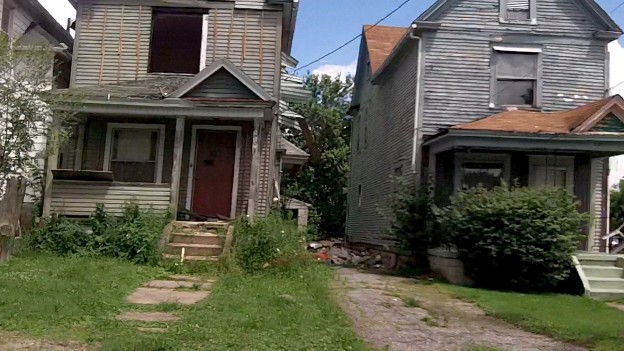- Details
- Written by: Kamran Mofid
- Hits: 3107
The youth of the world, our hope for a better future, did not cause the financial meltdown. But, they are the ones paying the heaviest price and suffering its painful consequences. This is unjust.
A society that neglects its young on this scale, and puts such pressure on them, is one that has lost its way. We have to refashion our economic model so that it works for everyone – particularly the young- Details
- Written by: Kamran Mofid
- Hits: 5148

“Youngstown, Ohio, was once a thriving steel centre. Now, the industry has all gone and the city is full of abandoned homes and businesses. ”
Photo: therealstreetz.com
Thirty years ago, the old deal that held US society together started to unwind, with social cohesion sacrificed to greed. It is no wonder that more and more Americans believe the game is rigged. It is no wonder that they buy houses they cannot afford and then walk away from the mortgage when they can no longer pay. Once the social contract is shredded, once the deal is off, only suckers still play by the rules.
“In or around 1978, America's character changed. For almost half a century, the United States had been a relatively egalitarian, secure, middle-class democracy, with structures in place that supported the aspirations of ordinary people. You might call it the period of the Roosevelt Republic. Wars, strikes, racial tensions and youth rebellion all roiled national life, but a basic deal among Americans still held, in belief if not always in fact: work hard, follow the rules, educate your children, and you will be rewarded, not just with a decent life and the prospect of a better one for your kids, but with recognition from society, a place at the table… The Roosevelt Republic had plenty of injustice, but it also had the power of self-correction.
Americans were no less greedy, ignorant, selfish and violent then than they are today, and no more generous, fair-minded and idealistic. But the institutions of American democracy, stronger than the excesses of individuals, were usually able to contain and channel them to more useful ends.”
But, the above was the case untill America went on a different path, neo-liberalism, powered by greed.
“In Youngstown, Ohio, the steel mills that had been the city's foundation for a century closed, one after another, with breathtaking speed, taking 50,000 jobs from a small industrial river valley, leaving nothing to replace them. In Cupertino, California, the Apple Computer Company released the first popular personal computer, the Apple II. Across California, voters passed Proposition 13, launching a tax revolt that began the erosion of public funding for what had been the country's best school system. In Washington, corporations organised themselves into a powerful lobby that spent millions of dollars to defeat the kind of labour and consumer bills they had once accepted as part of the social contract. Newt Gingrich came to Congress as a conservative Republican with the singular ambition to tear it down and build his own and his party's power on the rubble. On Wall Street, Salomon Brothers pioneered a new financial product called mortgage-backed securities, and then became the first investment bank to go public.
The large currents of the past generation – deindustrialisation, the flattening of average wages, the financialisation of the economy, income inequality, the growth of information technology, the flood of money into Washington, the rise of the political right – all had their origins in the late 70s. The US became more entrepreneurial and less bureaucratic, more individualistic and less communitarian, more free and less equal, more tolerant and less fair. Banking and technology, concentrated on the coasts, turned into engines of wealth, replacing the world of stuff with the world of bits, but without creating broad prosperity, while the heartland hollowed out. The institutions that had been the foundation of middle-class democracy, from public schools and secure jobs to flourishing newspapers and functioning legislatures, were set on the course of a long decline…”
Read the whole article:
George Packer , “Decline and fall: how American society unravelled”
http://www.guardian.co.uk/world/2013/jun/19/decline-fall-american-society-unravelled
For further reading see:
The Damning Impact of a Toxic Philosophy on America: The Tragedy of Ayn Rand
- Details
- Written by: Kamran Mofid
- Hits: 7175
A generous heart, kind speech, and a life of service and compassion are the things which renew humanity. ~The Buddha~
“As human beings, we will inevitably encounter suffering at some point in our lives. However, we also have evolved very specific social mechanisms to relieve that pain: altruism and compassion.”
“Our poverty in the West is not that of the wallet but rather that of social connectedness.”
Integrating Compassion and Wisdom
The Highest Possible Wisdom is Compassion and Kindness

Photo:Mindfulness Association
The Dalai Lama was once asked what surprised him most, he said "Man.” Because he sacrifices his health in order to make money. Then he sacrifices money to recuperate his health. And then he is so anxious about the future that he does not enjoy the present; the result being that he does not live in the present or the future; he lives as if he is never going to die, and then dies having never really lived."
As James Doty, Professor of Neurosurgery, Stanford University School of Medicine; Director, Center for Compassion and Altruism Research and Education, and the Chair of the Dalai Lama Foundation Board of Directors writing in a recent article has asked: “Why, in a country that consumes 25% of the world’s resources (the U.S.), is there an epidemic of loneliness, depression, and anxiety? Why do so many in the West who have all of their basic needs met still feel impoverished? While some politicians might answer, “It’s the economy, stupid,” based on scientific evidence, a better answer is, “It’s the lack compassion, stupid.”
The above observations, thus, remind us that a fundamental reappraisal of our place in reality is urgently called for in order to break the iron grip of materialism, consumerism, selfishness, greed and individualism, so that we may free ourselves to lead a life with heart and soul; halting the ongoing process of dehumanisation in modern, consumerist society, enabling and empowering us to control the immense forces now held in frail human hands.
Doty writes that: “I recently attended the Templeton Prize ceremony at St. Paul’s Cathedral in London and have been reflecting on the words of His Holiness the Dalai Lama in conversation with Arianna Huffington: “If we say, oh, the practice of compassion is something holy, nobody will listen. If we say, warm-heartedness really reduces your blood pressure, your anxiety, your stress and improves your health, then people pay attention.” As director of the Center for Compassion and Altruism Research and Education (CCARE) at Stanford University (one of the two organizations recognized in the Templeton Prize press release), I would agree with the Dalai Lama,” says Doty.
What exactly is compassion? Compassion is the recognition of another’s suffering and a desire to alleviate that suffering. Often brushed off as a hippy dippy religious term irrelevant in modern society, rigorous empirical data supports the view of all major world religions: compassion is good.
Our poverty in the West is not that of the wallet but rather that of social connectedness. In this modern world where oftentimes both parents work, we are spending less time as a family. People are living farther away from extended families and perhaps more disconnected than ever before as suggested by Robert Putnam in Bowling Alone. Putman observes that we thrive under conditions of social connection but that trust and levels of community engagement are on the decline. Loneliness is on the rise and is one of the leading reasons people seeking counselling.
Close Enough to Share a Problem
“One particularly telling survey showed that 25% of Americans have no one that they feel close enough with to share a problem. That means that one in four people that you meet has no one to talk to and it is affecting their health. Steve Cole from UCLA, a social neuro-genetics scientist, has shown that loneliness leads to a less healthy immune stress profile at the level of the gene – their gene expression makes them more vulnerable to inflammatory processes which have been shown to have negative effects on health. Research by expert well-being psychologists Ed Diener and Martin Seligman indicates that social connectedness is a predictor of longer life, faster recovery from disease, higher levels of happiness and well-being, and a greater sense of purpose and meaning. One large-scale study showed that lack of social connectedness predicts vulnerability to disease and death above and beyond traditional risk factors such as smoking, blood pressure, obesity and lack of physical activity.
While many pay attention to their diet and go to the gym regularly to improve their health, they don’t think of social connectedness this way. Just like physical fitness, compassion can be cultivated and maintained. Chuck Raison and colleagues at Emory University have demonstrated that a regular compassion meditation practice reduces negative neuroendocrine, inflammatory and behavioral responses to psychosocial stress. Exercising compassion not only strengthens one’s compassion but brings countless benefits to oneself and others. In fact, Jonathan Haidt at the University of Virginia and others have shown that, not only are we the recipient of compassion’s benefits but others are inspired when they see compassionate actions and in turn become more likely to help others in a positive feedback loop.
As human beings, we will inevitably encounter suffering at some point in our lives. However, we also have evolved very specific social mechanisms to relieve that pain: altruism and compassion. It is not just receiving compassion that relieves our pain. Stephanie Brown, professor at SUNY Stony Brook University and the University of Michigan, has shown that the act of experiencing compassion and helping others actually leads to tremendous mental and physical well-being for us as well. While survival of the fittest may lead to short-term gain, research clearly shows it is survival of the kindest that leads to the long-term survival of a species. It is our ability to stand together as a group, to support each other, to help each other, to communicate for mutual understanding, and to cooperate, that has taken our species this far. Compassion is an instinct. Recent research shows that even animals such as rats and monkeys will go through tremendous effort and cost to help out another of its species who is suffering. We human beings are even more instinctually compassionate; our brains are wired for compassion.”
This article was originally published by Huffington Post on June 7, 2012
See more:
Kamran Mofid, “Beyond the Wasteland: Seven Common Good Steps to Build a Compassionate World”
- "Together, we can do it yourself": Let Us commence Toward the Common Good
- G8 Justice and Dignity for Africa? Gleneagles (2005), Lough Erne (2013): Hope they can do better than Berlin (1884)
- Loans of up to 4000% interest on offer to students at British campuses: The nadir of greedy capitalism
- Life too busy? Don’t forget to say “I love you” to those you love
- Detroit and Windsor: The Curse of the tar sands of Alberta
